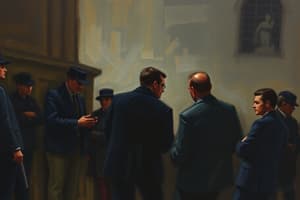Podcast
Questions and Answers
According to Conflict Theory, who has the most influence over law-making in society?
According to Conflict Theory, who has the most influence over law-making in society?
- Low power groups
- Groups with high power (correct)
- All social groups equally
- The general consensus of the population
In Conflict Theory, if a lower power group's norms differ from those of a higher power group, they will not face punishment.
In Conflict Theory, if a lower power group's norms differ from those of a higher power group, they will not face punishment.
False (B)
What is the role of informal social control according to Conflict Theory?
What is the role of informal social control according to Conflict Theory?
Promote conformity to societal rules through family, peers, and socialization.
Law reflects the common interests of society as a whole according to ___________ Theories.
Law reflects the common interests of society as a whole according to ___________ Theories.
Which of the following best describes the perspective of Consensus Theories?
Which of the following best describes the perspective of Consensus Theories?
The Functionalist Theory suggests that laws serve no purpose for public welfare.
The Functionalist Theory suggests that laws serve no purpose for public welfare.
What does the term 'normative system' refer to in the context of social control?
What does the term 'normative system' refer to in the context of social control?
Match the following concepts with their definitions:
Match the following concepts with their definitions:
What does the process of law making, breaking, and enforcement primarily reflect according to Conflict Theory?
What does the process of law making, breaking, and enforcement primarily reflect according to Conflict Theory?
Criminal definitions are objective and universally accepted across all segments of society.
Criminal definitions are objective and universally accepted across all segments of society.
What factors influence who is apprehended and punished within the legal system?
What factors influence who is apprehended and punished within the legal system?
Crime is defined as acts that conflict with the interests of the ______ group(s) in society.
Crime is defined as acts that conflict with the interests of the ______ group(s) in society.
Match the following terms with their definitions:
Match the following terms with their definitions:
What role do special interests play according to Conflict Theory?
What role do special interests play according to Conflict Theory?
The influence of lobbyists is negligible in shaping public policy according to Conflict Theory.
The influence of lobbyists is negligible in shaping public policy according to Conflict Theory.
According to Conflict Theory, how are 'crime' and 'criminals' described?
According to Conflict Theory, how are 'crime' and 'criminals' described?
Flashcards
Conflict Theory in Criminology
Conflict Theory in Criminology
Conflict theory sees society as divided by competing groups, with the powerful creating and enforcing laws to maintain their dominance.
Social Control
Social Control
Mechanisms, formal and informal, that regulate behavior to maintain conformity to social norms.
Informal Social Control
Informal Social Control
Rules and regulations enforced by family, peers, and other groups through socialization and sanctions.
Formal Social Control
Formal Social Control
Signup and view all the flashcards
Consensus Theory
Consensus Theory
Signup and view all the flashcards
Functionalist Theory (variant of Consensus Theory)
Functionalist Theory (variant of Consensus Theory)
Signup and view all the flashcards
Normative System
Normative System
Signup and view all the flashcards
Socialization
Socialization
Signup and view all the flashcards
Conflict Theory of Law
Conflict Theory of Law
Signup and view all the flashcards
Dominant Group
Dominant Group
Signup and view all the flashcards
Criminal Definitions
Criminal Definitions
Signup and view all the flashcards
Application of Laws
Application of Laws
Signup and view all the flashcards
Social Factors in Crime
Social Factors in Crime
Signup and view all the flashcards
Crime as a Political Construct
Crime as a Political Construct
Signup and view all the flashcards
Influence of Special Interests
Influence of Special Interests
Signup and view all the flashcards
Social Class and Crime
Social Class and Crime
Signup and view all the flashcards
Study Notes
Conflict Theory
- Society is divided into groups with competing ideas and values
- Groups with more power create laws and control society
- Members of powerful groups may still adhere to their own internal group norms.
- If a group's norms differ from the powerful group, they are violating the law and will be punished.
- Group and culture conflict explain law, criminal justice, and criminal behavior.
Social Control
- A normative system with rules for acceptable behavior
- A system of mechanisms (both formal and informal) to control deviation from rules and promote conformity
- Informal social control includes:
- Rules and regulations enforced by family, peers, and other groups
- Socialization (learning values, norms, and customs)
- Application of positive and negative social sanctions
- Formal social control includes:
- Laws and regulations enforced by the state
- External application of formal negative actions (e.g., punishment) by police and the criminal justice system (CJS).
Consensus Theories
- Law develops from widespread societal agreement on norms
- Law reflects common interests of society
- Consensus theory (Durkheim, 1893; Sumner, 1906; Weber, 1921) describes:
- Formal systems of laws and enforcement
- Reflection of general agreement on right and wrong
- Incorporation of norms with widest acceptance.
- Functionalist Theory (Trevino, 1996) suggests laws aim at greater public welfare by:
- Resolving disputes
- Regulating disruptive behavior
- Controlling crime (even if it does or doesn't deter)
Conflict Theory (Continued)
-
Lawmaking, breaking, and enforcement reflect deep-seated conflict over power and control (Vold, 1958; Quinney, 1970).
-
Dominant groups use power (political, social, and monetary) to shape policy, law enforcement, and justice administration.
-
Criminal definitions are acts that violate the norms and interests of dominant groups.
-
Social factors (age, race, sex, social class, education, occupation, and political/social influence) affect crime apprehension, processing, and punishment.
-
"Crime" and "criminals" are political constructs determined by those in power.
-
Special interests (lobbyists) influence legislation and administrative regulations.
-
Examples include: AARP, California Correctional Peace Officers Association, the NRA.
-
Court decisions (e.g., Citizens United v. Federal Election Commission) influence law and policy.
-
Public opinion on crime and criminal justice also influences policy.
Studying That Suits You
Use AI to generate personalized quizzes and flashcards to suit your learning preferences.




